trade topics
Small business and trade
The participation of micro, small and medium-sized enterprises (MSMEs) in international trade has remained limited for numerous reasons. These include lack of relevant skills, lack of knowledge about international markets, non-tariff barriers, cumbersome regulations and border procedures, and limited access to finance, in particular trade finance. The smaller the company, the greater the challenges faced in participating in international trade. The WTO has launched a number of initiatives to help MSMEs play a more active role in world trade.
See also:
- Trade finance
- Trade Dialogues
- MSME provisions in regional trade agreements
- MSME references in trade policy reviews
Guides from Trade4MSMEs.org
News
WTO initiatives
Informal Working Group on MSMEs
The Informal Working Group on MSMEs was launched at the 11th Ministerial Conference in December 2017. The Group aims to identify and address obstacles to MSME participation in international trade. It currently consists of 91 WTO members and is open to all members.
Global Trade Helpdesk
The Global Trade Helpdesk is an online platform that simplifies market research for companies, especially MSMEs, by integrating trade and business information into a single online portal. The Helpdesk was launched jointly by the International Trade Centre, the UN Conference on Trade and Development (UNCTAD) and the WTO at the WTO’s 11th Ministerial Conference in Buenos Aires in December 2017.
Global Trade Helpdesk: trade intelligence for all
Working Group on Trade, Debt and Finance
The Working Group on Trade, Debt and Finance looks into how trade-related measures can contribute to solving the problems of debt faced by developing countries and how to improve the availability of trade finance, notably for MSMEs.
Government procurement
The WTO's Government Procurement Committee launched a work programme on MSMEs in 2012 to facilitate MSME participation in government procurement projects and to maximize their potential for growth. Increasing MSMEs participation in government procurement also ensures a more competitive bidding process, thus achieving better value for money in government purchases.
More about government procurement
Intellectual property
In the Council for Trade-related Aspects of Intellectual Property Rights (TRIPS), WTO members exchange information about their policies aimed at supporting MSMEs' creativity, inventiveness and investments in research and technology. Members have recognized the particular significance of intellectual property rights for small businesses, whose intellectual capital is often their main asset. The MSME-related policies presented in that context include financial assistance schemes, streamlining application procedures, and enhanced transparency of intellectual property rules.
Aid for Trade
The 2018-19 Work Programme for Aid for Trade (A4T), a multi-stakeholder initiative, looked into how trade could contribute to economic diversification, empowerment and poverty reduction through the effective participation of MSMEs, women and youth. The programme also reviewed how A4T addresses trade-related infrastructure constraints, including for MSMEs. The draft programme for 2020-21 stresses the importance of MSME-dominated sectors, such as agriculture and tourism, in boosting economic development.
Enhanced Integrated Framework (EIF) and the Standards and Trade Development Facility (STDF)
The WTO, in collaboration with other agencies, supports initiatives designed to assist developing countries benefit from trading opportunities. The EIF helps governments address constraints related to competitiveness, growth potential and supply chain weaknesses, including specific constraints faced by MSMEs. The STDF helps governments improve the implementation of sanitary and phytosanitary measures to increase trading opportunities for MSMEs.
More about the EIF and the STDF
Initiatives with the private sector and others
Trade Dialogues
MSME participation in international trade is one of the issues discussed by the WTO's Trade Dialogues series, where stakeholders such as the private sector have the opportunity to highlight issues they find important.
Small Business Champions
Launched in 2021 by the International Chamber of Commerce (ICC), the International Trade Centre (ITC) and the WTO Informal Working Group on Micro, Small and Medium Sized Enterprises (MSMEs), the Small Business Champions is an annual competition that provides an opportunity for businesses, industry associations, chambers of commerce and non-governmental organizations to propose innovative, practical ways of helping small businesses play a more active role in world trade.
More about the Small Business Champions
MSME research notes
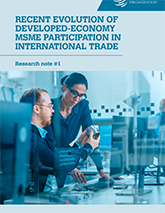
Recent Evolution of Developed-economy MSME Participation in International Trade
This research note updates figures and information from the 2016 World Trade Report for developed-economy MSME trade participation.
Find out more
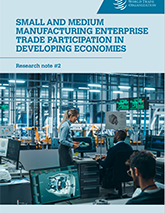
Small and Medium Manufacturing Enterprise Trade Participation in Developing Economies
This research note updates figures and information from the 2016 World Trade Report on small and medium-sized manufacturing enterprise trade participation within developing economies.
Find out more
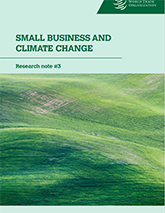
Small Business and Climate Change
This research note uses survey responses from a Meta business questionnaire to investigate MSME perceptions of decarbonization and its intersection with trade.
Find out more
WTO publications on MSMEs
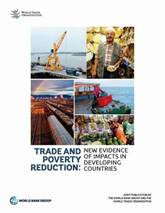
Trade and Poverty Reduction: New evidence of impacts in developing countries (2018)
This report presents eight case studies that demonstrate how the reduction in high trade transaction costs faced by small-scale traders can help reduce poverty in developing countries.
Find out more
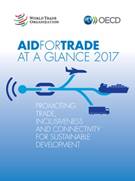
Aid for Trade at a Glance 2017: Promoting trade, inclusiveness and connectivity for sustainable development (2017)
This report describes how digital connectivity helps connect MSMEs to international trade opportunities and how Aid for Trade addresses digital connectivity barriers.
Find out more
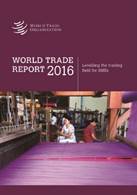
World Trade Report 2016 - Levelling the trading field for SMEs (2016)
This report examines the participation of SMEs in international trade, how the international trade landscape is changing for SMEs, and what the multilateral trading system does and can do to encourage more widespread and inclusive SME participation in global markets.
Find out more
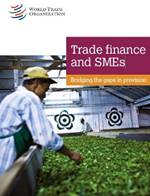
Trade Finance and SMEs: Bridging the gaps in provision (2016)
This report discusses the challenges faced by MSMEs in accessing trade finance and provides a set of recommendations for addressing the gap in trade finance provision, with a view to enhancing the trading capacity of MSMEs in developing countries
Find out more
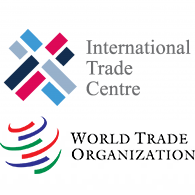
Connecting Developing Country SMEs to Global Value Chains
This ITC-WTO report explores constraints faced by exporting MSMEs in 23 least developed countries, and how Aid for Trade initiatives address these challenges for MSMEs.
Find out more
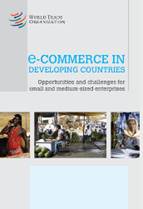
E-commerce in Developing Countries: Opportunities and challenges for small and medium-sized enterprises (2013)
This report assesses how issues concerning adequate levels of telecoms infrastructure, regulation and investment either help or hinder MSMEs from finding new opportunities through e-commerce.
Find out more
WTO working papers on MSMEs
Provisions on Small and Medium-sized Enterprises in Regional Trade Agreements (2018)
Analyses MSME-related provisions in regional trade agreements.
E-commerce and Developing Country-SME Participation in Global Value Chains (2018)
Looks at evidence from the World Bank’s Enterprise Survey Database that digital connectivity increases the participation of MSMEs in developing countries in global value chains.
Supply Chain Finance and SMEs: Evidence from international factoring data (2016)
The unbundling of trade across regions offers unique opportunities for SMEs to integrate into global trade, notably through their involvement in supply chains. This paper looks at its effects, using data from Factor Chain International.
SMEs in Services Trade – a GATS Perspective (2012)
Seeks to provide an overview of issues that WTO members might want to address in the WTO, from promoting compliance with transparency disciplines under existing provisions to advancing the liberalization and rule-making mandates of the General Agreement on Trade in Services (GATS) with an SME focus.
Share
Problems viewing this page? If so, please contact [email protected] giving details of the operating system and web browser you are using.